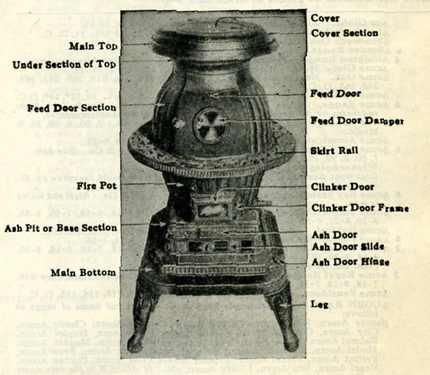Each and every morning, my grandfather would get up and chop some “kindling” from his favorite pile of firewood. This consisted chiefly of what was known as "lighter'd", "lighter wood," or "fat lighter", which was in actuality "heart pine", or that portion of wood derived from the heartwood of the ubiquitous southeastern pine tree.
This prized material usually came from a stump that had been left in the ground after a pine tree had either been cut down or else had fallen on its own. The resin-impregnated heartwood within the stump would become very hard over time. As a result, it was excellent for starting fires – hence, the word “kindling”.
My grandfather would then open the "feed" door, place some newspaper in the bottom of the fire pot, cover this with "lighter'd", and then add twigs and/or smaller pieces of wood. Finally, over the top of this pile, he would place larger pieces of firewood. At this point, all that remained was to strike a match and light the paper.
Soon enough, the resin-soaked fatwood would catch fire, and this in turn would spread to the waiting grain of the split logs up above. Before long, a blazing fire within the stove would begin to emit heat and the living room would soon become nice and cozy as a result.
After a few minutes, however, my grandfather would invariably sense the need to adjust the feed door "damper" on the stove. This ingenious little device consisted of a rotatable plate that allowed for regulating the draft, or amount of air, that was allowed into the fire pot to feed the fire. Whenever the damper was wide open, a large amount of air was allowed in, fueling the fire within. Conversely, whenever the damper was completely closed, the air supply was cut off, effectively killing the fire within the stove.
Simply put: the degree to which the damper was either opened or closed impacted the amount of air the fire would receive, and as a direct result, the size of the fire itself. Obviously, there was an art to just how much the damper was to be adjusted – both at what point and to what degree. If left too far open, the fire raged and the room quickly overheated; if closed off too much or too quickly, the fire ebbed and the room soon cooled beyond what was acceptable.
I share this illustration in light of what the Apostle Paul told his young protégé Timothy (in his Second eponymous New Testament letter to this young man, chapter 1, verses 1-8):
“1Paul, an apostle of Christ Jesus by the will of God, in keeping with the promise of life that is in Christ Jesus, 2To Timothy, my dear son: Grace, mercy and peace from God the Father and Christ Jesus our Lord.
3I thank God, whom I serve, as my ancestors did, with a clear conscience, as night and day I constantly remember you in my prayers. 4Recalling your tears, I long to see you, so that I may be filled with joy. 5I am reminded of your sincere faith, which first lived in your grandmother Lois and in your mother Eunice and, I am persuaded, now lives in you also.
6For this reason I remind you to fan into flame the gift of God, which is in you through the laying on of my hands. 7For the Spirit God gave us does not make us timid, but gives us power, love and self-discipline. 8So do not be ashamed of the testimony about our Lord…”
Verse 6 is especially significant. Here, Paul admonishes young Timothy not to let his God-given gift-set flame out. The three words “fan into flame” are actually one word in the original Koiné (or common) Greek language in which the New Testament was first penned: “ana-zō-pyr-ein”, which translates as “to stir up a flame”. This compound word is in turn a combination of three other terms: “an-ah'” (“anew”) and “zóon” (“make something alive”) and “pur” (“fire”). (“Ein” is simply the ending having has to do with the tense, voice, and mood of the verb.)
Elsewhere in the New Testament, the same Apostle Paul told the Christians at Thessalonica (in his First New Testament Letter to the Thessalonians, chapter 5, verse 19): “Do not quench the Spirit.” The key term here is “quench”. The Koiné Greek word here is “sbennumi”, which is variously translated as “to extinguish, to quench, to suppress, or to thwart”.
The word picture is that of pouring water on a flame in order to douse it. But there are many ways to extinguish as flame, including depriving it of air too soon or too often.
I offer all of this simply to remind us as believers that we have the responsibility not to thwart the work of the Holy Spirit in our lives. The Bible indicates that there are clearly things which we can do that will either enhance or hamper the work of the Holy Spirit in and through our lives. And, by the same token, there are things which we can do which will enhance the work of the Holy Spirit in and though us.
For my part, I want to fan into flame the Spirit within me; and not to quench, or thwart Him and His purposes in any way. I hope you share this desire. And I hope the result will be evident in both my life and yours.
SOURCE: http://www.antiquestoves.net/dir/images/specials/potbelly/PBglobelinedraw%20430.jpg.
SCRIPTURE SOURCES:
http://biblehub.com/niv/2_timothy/1.htm.
http://biblehub.com/greek/329.htm.
http://biblehub.com/1_thessalonians/5-19.htm.
http://biblehub.com/text/1_thessalonians/5-19.htm.
